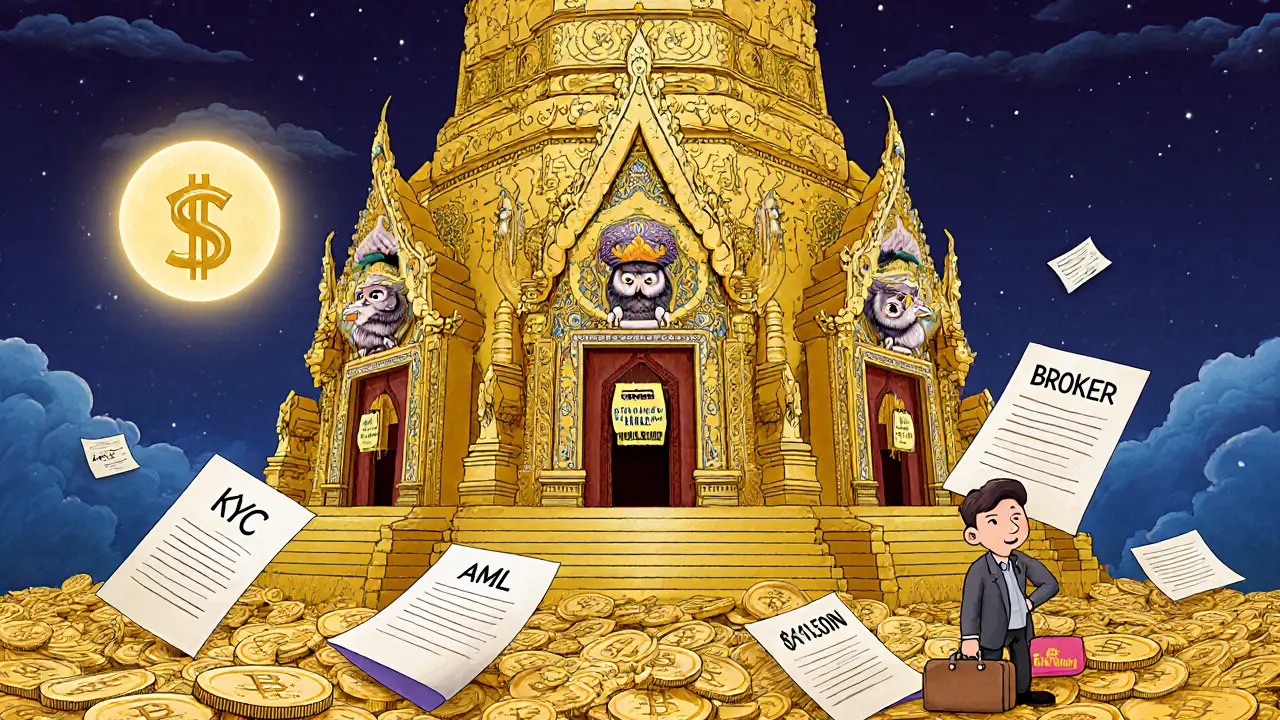
Thai Crypto License Cost Calculator
Estimate the total investment needed to launch a licensed crypto exchange in Thailand based on current regulations. This tool helps you understand the significant financial commitment required by Thailand's regulatory framework.
Estimated Total Investment: 52,500,000 THB
Note: Thailand requires a minimum capital of 50,000,000 THB plus a 2,500,000 THB licensing fee. Additional operational costs typically bring the total to $2.5 million USD or more.
If you're thinking about launching or using a crypto exchange in Thailand, you need to understand one thing: Thai crypto exchange licensing requirements aren't just paperwork-they're a full-scale operational overhaul. This isn't a quick registration. It's a multi-million-dollar commitment with strict rules, long wait times, and zero room for guesswork. And if you're a foreign platform trying to serve Thai users, the rules just got even tighter.
Why Thailand's Crypto Rules Are Different
Thailand didn't ban crypto. It didn't ignore it. It built a system. Since 2018, the Emergency Decree on Digital Asset Businesses laid the foundation. But in April 2025, a major update came into force: the Royal Decree on the Operation of Digital Asset Businesses (No. 2) B.E. 2568. This wasn't a tweak. It was a reset.Before 2025, foreign exchanges could operate in Thailand without a local license-just by letting Thai users sign up. Now, that’s illegal. Any platform targeting Thai residents, even if it's based in Singapore or the U.S., must get licensed by Thailand’s Ministry of Finance. The goal? Stop offshore operators from dodging local rules. Protect Thai investors. Make the market trustworthy.
That’s why Thailand now has 12 licensed exchanges, 13 brokers, and 3 dealers. The number isn’t huge, but every one of them passed a brutal vetting process. Users know this. They check the SEC’s official website before depositing a single baht. That’s the kind of trust most countries still dream of.
The Financial Hurdles: It’s Not Cheap
Let’s get real about the money. You can’t start a crypto exchange in Thailand with a laptop and a bank account. You need serious capital.- Minimum share capital: 50 million THB (about $1.4 million USD). This cash must be deposited in a Thai bank before you even submit your application.
- Licensing fee: 2.5 million THB (around $70,000 USD). Non-negotiable. Non-refundable.
- Total upfront cost: Roughly 52.5 million THB, or $2.1 million USD.
That’s not the end of it. Legal fees, compliance software, office space, Thai staff salaries, cybersecurity audits, accounting systems-those add another $500,000 minimum. Most companies spend 6 to 12 months preparing just to apply. The total investment often hits $2.5 million or more before you open your doors.
Compare that to other countries. In some places, you can launch a crypto exchange with $50,000 and a website. In Thailand? You’re competing with banks. That’s intentional. The government wants operators who can survive a market crash, not disappear after six months.
Who Can Apply? The Three License Types
Thailand doesn’t treat all crypto businesses the same. There are three main licenses:- Digital Asset Exchange: Lets you run a trading platform where users buy and sell crypto. This is what most people think of as a crypto exchange. All 12 licensed platforms in Thailand hold this.
- Digital Asset Broker: Acts as an intermediary, buying or selling crypto on behalf of clients. Think of it like a stockbroker, but for Bitcoin. There are 13 licensed brokers.
- Digital Asset Dealer: Buys and sells crypto for its own account, not clients. Only 3 dealers are licensed-this is the rarest type.
There are also licenses for ICO portals, custodial wallets, fund managers, and advisors. But those are almost unheard of. Only two companies have licenses for custodial wallets. Only two for fund management. The market isn’t demanding them yet. Or the rules are too tough.

The Application Process: 150 Days of Pressure
The Ministry of Finance says the official review takes 150 days. But that’s only if everything’s perfect. Most applicants take longer.Here’s what you need to get through:
- Register a Thai company. You can’t use a foreign entity.
- Open a local bank account and deposit the 50 million THB.
- Set up a physical office in Thailand with Thai employees.
- Build a full AML-CFT system-anti-money laundering and counter-terrorism financing. This includes KYC software that meets Thai standards.
- Submit a detailed business plan: cash flow projections, tech architecture, security protocols, team bios.
- Get your IT infrastructure audited for cybersecurity compliance.
- Have a Thai-certified accountant and auditor on retainer.
The SEC doesn’t just check your documents. They interview your team. They test your systems. They look for gaps. One missing policy, one unverified employee, one weak password protocol-and your application gets rejected. No second chances.
What Happens After You Get Licensed?
Getting the license isn’t the finish line. It’s the starting line.Licensed exchanges must:
- Submit monthly transaction reports to the SEC.
- Undergo annual audits by approved Thai auditors.
- Keep all user data stored locally in Thailand.
- Update their KYC procedures every time regulations change.
- Report suspicious activity within 24 hours.
There’s no off-switch. You’re under constant supervision. The SEC runs regulatory sandboxes too-like the 2025 tourism pilot that lets visitors convert crypto at airports. That’s innovation. But it’s still under strict control.
Most licensed exchanges now offer Thai-language support, local payment options (PromptPay, bank transfers), and clear compliance info on their websites. That’s not marketing-it’s law.

Who Benefits? Who Gets Left Behind?
The winners? Big players. International firms with deep pockets. Banks looking to enter crypto. Hedge funds wanting regulated exposure. Thailand’s system gives them legal certainty. They can partner with traditional financial institutions. They can open bank accounts. They can scale.The losers? Small startups. Local entrepreneurs without $2 million. Independent developers. Anyone who thought they could build a crypto exchange like a side project.
That’s the trade-off. Thailand traded market diversity for stability. You get fewer exchanges-but you know they’re safe. You get less innovation in the short term-but more trust in the long term.
And users? They’re the real winners. In 2025, 11.6% of Thailand’s population owns crypto. That’s over 8 million people. And almost all of them use licensed platforms. They know how to check the SEC’s list. They avoid unlicensed sites. That’s not luck. That’s regulation working.
What’s Next for Thailand’s Crypto Rules?
The 2025 update closed the biggest loophole: foreign platforms targeting Thai users. But there are still gaps.DeFi protocols? Not covered. NFT marketplaces? Barely mentioned. Stablecoins? Still in a gray zone. The SEC says they’re watching. Analysts expect new rules by late 2026.
Thailand isn’t trying to be the cheapest place to launch crypto. It’s trying to be the safest. That’s why it’s becoming a regional hub-competing with Singapore and Hong Kong, but with stronger consumer rules. If you want to operate in Southeast Asia, Thailand isn’t the easiest path. But it might be the most respected.
For now, if you’re serious about crypto in Thailand, you don’t look for shortcuts. You prepare. You invest. You comply. And you wait.
Do foreign crypto exchanges need a Thai license?
Yes. Since April 13, 2025, any digital asset business that provides services to Thai residents-even if based overseas-must obtain a license from Thailand’s Ministry of Finance. Operating without one is illegal. The SEC actively monitors and blocks unlicensed platforms targeting Thai users.
How much does it cost to get a Thai crypto exchange license?
The total upfront cost is approximately 52.5 million THB (around $2.1 million USD). This includes a mandatory 50 million THB share capital deposit and a 2.5 million THB licensing fee. Additional costs for legal help, compliance systems, office setup, and staff can push the total over $2.5 million USD.
How long does the Thai crypto licensing process take?
The official review period is 150 days. But most applicants spend 6 to 12 months preparing before submitting their application. This includes incorporating a Thai company, setting up local operations, building compliance systems, and gathering documentation. Delays are common if documents are incomplete or systems don’t meet SEC standards.
Can I run a crypto exchange in Thailand without a license?
No. Operating a crypto exchange without a license is illegal under Thailand’s Emergency Decree on Digital Asset Businesses. Unlicensed platforms are blocked by Thai authorities, and operators risk criminal charges, fines, and asset seizures. Users are strongly advised to only use platforms listed on the SEC’s official website.
What’s the difference between a crypto exchange and a broker in Thailand?
A Digital Asset Exchange lets users trade crypto directly with each other on a platform. A Digital Asset Broker acts on behalf of clients-buying or selling crypto for them, but not allowing direct peer-to-peer trading. Exchanges handle order books and matching; brokers handle transactions as agents. Both require separate licenses under Thai law.
How can I verify if a crypto exchange is licensed in Thailand?
Go to the official website of Thailand’s Securities and Exchange Commission (SEC) and check their public list of licensed digital asset businesses. Only platforms on this list are legally authorized to operate. Never trust third-party sites or social media claims-always verify directly with the SEC.
Are DeFi and NFTs regulated in Thailand yet?
Not yet in a clear, comprehensive way. The current licensing framework focuses on exchanges, brokers, dealers, and custodial wallets. DeFi protocols and NFT marketplaces fall into a gray area. The SEC has signaled it’s working on future regulations, but no formal rules exist as of late 2025. Operators in these spaces are advised to proceed with caution and monitor official updates.
17 Comments
Write a comment
More Articles

Coin8 Exchange Crypto Exchange Review: Is It Safe and Worth Trying in 2025?
Coin8 Exchange offers crypto trading with AI tools and global offices, but lacks user reviews, regulatory licenses, and security transparency. Is it safe in 2025? The answer may surprise you.

EU Sanctions and Cryptocurrency Compliance: What You Need to Know in 2025
As of 2025, EU cryptocurrency compliance is enforced through MiCA, TFR, and CARF. All crypto service providers must license up, track every transaction over €1,000, and report to tax authorities. Non-compliance means fines, blacklisting, or criminal liability.

sandeep honey
November 14, 2025 AT 23:22Thailand's rules are brutal but smart. You want to operate here? You better bring real money and real infrastructure. No more offshore shell games. I've seen too many crypto platforms vanish overnight in other countries. This is how you build trust. No fluff, no hype, just hard requirements. If you can't meet this, you don't deserve to serve Thai users.